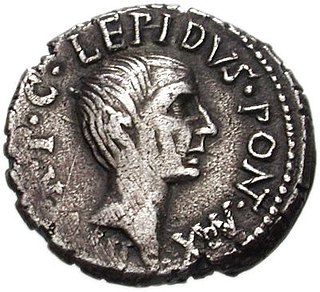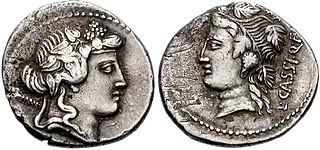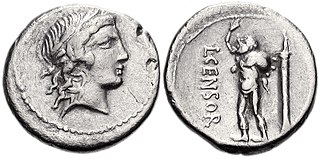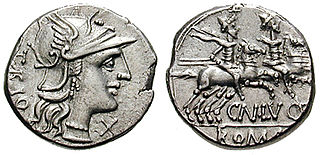 W
WA triumvir monetalis was one of three moneyers appointed in Ancient Rome to oversee the minting of coins.
 W
WDuring the Roman Republic, moneyers were called tresviri aere argento auro flando feriundo, literally "three men for casting (and) striking bronze, silver (and) gold (coins)". This was a board of the college of the vigintiviri, or Board of twenty, vigintisexviri. The title was abbreviated III. VIR. AAAFF. or even III. VIR. A.P.F. on the coinage itself. These men were collectively known as the tresviri monetales or sometimes, less correctly, as the triumviri monetales. The singular is triumvir monetalis. In English, they are most correctly called mint magistrates, since 'moneyers' may imply that they actually struck the coins themselves.
 W
WManius Acilius Glabrio Gnaeus Cornelius Severus was a senator of the Roman Empire. He was consul ordinarius in 152 with Marcus Valerius Homullus as his colleague. Acilius Glabrio is known almost solely from surviving inscriptions.
 W
WMarcus Aemilius Lepidus was a Roman general and statesman who formed the Second Triumvirate alongside Octavian and Mark Antony during the final years of the Roman Republic. Lepidus had previously been a close ally of Julius Caesar. He was also the last Pontifex Maximus before the Roman Empire.
 W
WLucius Cassius Longinus was a Roman politician and a participant in the conspiracy of Catilina.
 W
WIn 82 BC, a denarius was minted by Lucius Marcius Censorinus picturing Apollo and Marsyas the satyr. The coin has attracted several interpretations because of the ambiguity of its symbolism.
 W
WGnaeus Gellius was a Roman historian. Very little is known about his life and work, which has only survived in scattered fragments. He continued the historical tradition set by Fabius Pictor of writing a year-by-year history of Rome from mythological times to his day. However, with about a hundred books, Gellius' Annales were massively more developed than the other Roman annalists, and was only surpassed by Livy's gigantic History of Rome.
 W
WPublius Licinius Crassus was one of two sons of Marcus Licinius Crassus, the so-called "triumvir", and Tertulla, daughter of Marcus Terentius Varro Lucullus. He belonged to the last generation of Roman nobiles who came of age and began a political career before the collapse of the Republic. His peers included Marcus Antonius, Marcus Junius Brutus, Decimus Junius Brutus Albinus, the poet Gaius Valerius Catullus, and the historian Gaius Sallustius Crispus.
 W
WGnaeus Lucretius Trio was a Roman moneyer, who minted denarii in Rome c. 136 BCE. He may be an ancestor of Lucius Lucretius Trio.
 W
WLucius Lucretius Trio was a Roman moneyer, who minted two denarii in c. 76 BCE.
 W
WMarcius Censorinus was a name used by a branch of the plebeian gens Marcia of ancient Rome. The cognomen Censorinus was acquired through Gaius Marcius Rutilus, the first plebeian censor, whose son used it. The gens Marcia claimed descent from both Ancus Marcius, a king of Rome, and symbolically from Marsyas the satyr, who was associated with free speech and political liberty; see further discussion at Prophecy and free speech at Rome. The Marcii Censorini were consistent populares, supporting Marius, Cinna, Julius Caesar, and Antonius.
 W
WGaius Marcius Censorinus was a Roman Senator who was elected consul in 8 BC.
 W
WMarcus Aurelius Antoninus was a Roman emperor from 161 to 180 and a Stoic philosopher. He was the last of the rulers known as the Five Good Emperors, and the last emperor of the Pax Romana, an age of relative peace and stability for the Roman Empire. He served as Roman consul in 140, 145, and 161.
 W
WLucius Neratius Marcellus was an imperial Roman military officer and senator who held a number of posts in the Emperor's service. Marcellus was elected consul twice, first under Domitian in 95 AD and again under Hadrian in 129. His life provides several examples of how patronage operated in early Imperial Rome.
 W
WQuintus Pomponius Musa was a magistrate, moneyer and banker during the Republican Period in Rome, around 66 BC. He was a member of the Pomponia gens.
 W
WGaius Porcius Cato was a Roman politician and general, notably consul in 114 BC. He was the son of Marcus Porcius Cato Licinianus and grandson of Cato the Censor.
 W
WTitus Quinctius Crispinus Sulpicianus was a Roman senator who was elected consul in 9 BC.